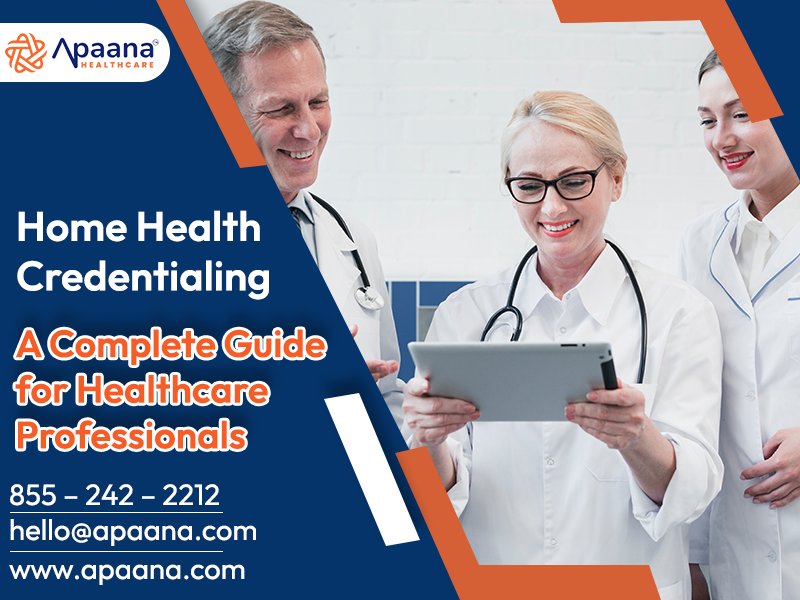Home health credentialing is a critical process for healthcare providers, ensuring that home health agencies and professionals meet required standards and comply with federal and state regulations. For healthcare professionals, particularly medical billing specialists and those in health care management, understanding credentialing is crucial to guarantee proper patient care and seamless administrative operations.
Proper credentialing not only protects patients but also improves operational efficiency, minimizes billing errors, and ensures compliance with regulatory authorities.
What is Home Health Credentialing?
At its core, home health credentialing is the verification and evaluation of a healthcare provider’s qualifications, experience, and licenses. This process confirms that professionals are legally authorized to deliver home healthcare services.
The credentialing process typically includes:
- Verification of educational qualifications and certifications
- License validation and status checks
- Background screenings for criminal history or abuse records
- Review of malpractice claims and work experience
This structured approach ensures that home health agencies maintain high standards of care and remain compliant with regulatory guidelines.
Importance of Home Health Credentialing for Medical Billing Specialists
For a medical billing specialist, home health credentialing directly impacts the accuracy and timeliness of billing processes. Credentialed providers are eligible to submit claims to insurance companies, reducing claim denials and payment delays.
Key benefits for medical billing specialists include:
- Accurate Claims Processing: Credentialed providers can bill insurance without delays, minimizing errors.
- Regulatory Compliance: Ensures claims meet CMS, Medicaid, and private insurance requirements.
- Efficient Revenue Cycle: Smooth credentialing prevents billing interruptions, boosting cash flow.
Without proper credentialing, billing specialists may face rejected claims, delayed reimbursements, and increased administrative workload.
Role of Home Health Credentialing in Health Care Management
In health care management, home health credentialing is more than a regulatory requirement—it is a strategic necessity. Credentialing guarantees that agencies employ qualified professionals, which enhances patient care quality and organizational reputation.
Benefits for health care managers include:
- Improved patient safety and quality of care
- Streamlined administrative workflows
- Stronger relationships with insurance providers and hospitals
- Reduced risk of legal or financial penalties
By aligning credentialing with medical billing procedures, health care managers ensure operational efficiency and accurate financial reporting.
The Step-by-Step Home Health Credentialing Process
Implementing home health credentialing involves multiple steps:
- Collect Provider Information: Gather licenses, certifications, education, and work history.
- Verify Credentials: Confirm details with licensing boards, professional associations, and previous employers.
- Conduct Background Checks: Screen for criminal history, abuse, or sanctions.
- Compliance Review: Ensure adherence to state and federal regulations.
- Ongoing Monitoring: Keep credentials updated to maintain compliance.
Following these steps helps agencies avoid lapses, maintain billing accuracy, and ensure consistent patient care quality.
Best Practices for Agencies and Specialists
To maximize the benefits of home health credentialing, agencies should adopt best practices:
- Credentialing Software: Automate verification and tracking to reduce errors.
- Documentation: Maintain accurate records for audits and inspections.
- Regular Staff Training: Educate staff on regulatory changes and credentialing updates.
- Team Collaboration: Foster communication between medical billing specialists, managers, and clinical staff.
These practices enhance efficiency, accuracy, and regulatory compliance, benefiting both patients and providers.
How Medical Billing Integrates with Home Health Credentialing
Medical billing is closely tied to credentialing. Billing specialists must confirm that providers are credentialed before submitting insurance claims. This integration ensures:
- Accurate reimbursement from insurers
- Reduced claim rejections and delays
- Compliance with federal and state healthcare regulations
Ultimately, credentialing and billing work together to maintain financial health while delivering quality care.
Conclusion
Home health credentialing is an essential component of modern healthcare, impacting patient safety, billing accuracy, and organizational reputation. For medical billing specialists and professionals in health care management, understanding and implementing proper credentialing practices ensures smooth operations, compliance, and reliable patient care. Agencies that prioritize credentialing enhance their credibility, streamline billing processes, and provide trustworthy, high-quality home healthcare services. By integrating credentialing with medical billing and management practices, healthcare organizations can achieve both operational efficiency and excellent patient outcomes.





